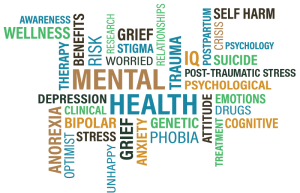Depression does not discriminate. It can affect anyone and everyone — not just in Tuscaloosa or Alabama, but nationally and internationally.
“Depression has increased by 18 percent since 2005 and is now the leading cause of ill-health and disability worldwide with more than 300 million people suffering, according to the World Health Organization,” said Dr. John Burkhardt, an assistant professor for The University of Alabama’s College of Community Health Sciences’ department of psychiatry and behavioral medicine and a practicing clinical health psychologist at University Medical Center.
That number represents only those with diagnosed depression, he said. Many people are suffering from undiagnosed mental illness. Depression also puts people at risk for other medical conditions such as increased risk of cardiovascular disease, diabetes, stroke and Alzheimer’s disease.
With October being National Depression Education and Awareness Month, let’s look at mental health. 
Mental health ultimately has to do with how someone functions in his or her world.
“All of us will go through periods when we may experience depression or anxiety,” Burkhardt said. “And for some of us, we will experience more problems functioning in one or multiple areas, whether it be work, home or interpersonally. Being in good mental health means having the resources and coping skills to manage these times, but most importantly remain functional, which means being able to manage the various areas of your life successfully, such as work, parenting, play, relationships, exercise, home, etc.”
Since Burkhardt moved to Tuscaloosa two years ago, he has seen a broad range of mental illness in his clinic. He sees a lot of depression and anxiety, but he said Alabama as a whole has problems with drug abuse, with either prescribed or nonprescribed drugs. He also sees many people trying to cope with some form of trauma in their life.
“There is not one common problem,” Burkhardt said. “Mental illness exists in many forms and is closer to home than we think.”
Despite the prevalence of mental illness, access to care and being able to afford care are two of the biggest challenges for individuals. When looking at mental health provider ratios, top U.S. providers have a 360:1 patient to provider ratio; Alabama is 1,260:1; and Tuscaloosa is 890:1. This is the ratio of the county population to the number of mental health providers, including psychiatrists, psychologists, licensed clinical social workers, counselors, marriage and family therapists, mental health providers who treat alcohol and other drug abuse and advanced practice nurses specializing in mental health care.
About 30 percent of Alabama’s population lives in a county designated as a Mental Health Professional Shortage Area, according to the University of Wisconsin Population Health Institute.
To help fill in the gap, UA offers multiple resources to its students, faculty and staff, as well as the community. These include the Betty Shirley Clinic, Student Health Center and Pharmacy, Counseling Center, Psychology Clinic, Employee Assistance Program and the Capstone Family Therapy Clinic.
Another challenge is the stigma surrounding mental illness, which might prevent someone from seeking help. There are several misconceptions, the most common being that it does not happen to “everyday or regular people,” and if someone gets diagnosed then there is something severely wrong with her or him.
“Stigma plays a big role in this. Negative emotions and reactions are apparent when the topic of mental illness arises. People get these negative pictures in their head whether it be from movies they have seen or their own perceptions of what people with poor mental health present like. They don’t understand that the severity can range from mild to severe, so they always assume it’s severe. We are now just getting to a point where people can talk about mental illness without feeling like they have been hiding a dirty secret.” Dr. John Burkhardt
Another misconception is that people should just be able “to get over it” because life is not easy. Although it’s true that life is full of challenges, having poor mental health does not mean the sufferers are failures or cannot manage their life. But it also doesn’t mean they can do it themselves.
“There is help for you,” Burkhardt said. “Just because you have a diagnosis does not mean your life has to stop. Many individuals live a full life managing their mental illness.”
Did you know?
In an average U.S. city of 20,000 people, 840 will have been diagnosed with depression. That’s an average of 13,393,800 people in the U.S. with diagnosed depression.
